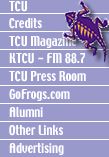|
Friday,
November 9, 2001
Deadline
for new UCR draft set back
By
Jacque Petersell
Staff Reporter
The deadline for the draft of the new University Core Curriculum
was pushed back until mid-November, allowing more time for
assessing proposed classes, said Richard Enos, chairman of
the committee.
Enos
said the current committee is focusing on drafting a new core.
The next committee will review the draft, look at ways to
implement the core and find ways to assess what a student
understands, he said.
The
original deadline for the first committee was the end of October,
Enos said. The deadline
was pushed back, he said, because the committee had to review
each class proposed for the new core.
Melissa
Canady, director of assessment for the committee, said the
new core could be implemented as soon as fall 2002.
The
core would have to be “grandfathered” in, where
it would only affect incoming freshmen.
Each
core course will be given equal consideration when deciding
which courses to keep, Enos said. No current courses will
get placed in the new core because each must first be evaluated.
However,
Enos said the committee isn’t looking to increase the
current 124 required UCR hours.
“We
want to work with the amount we already have,” Enos said.
“The effort is not to lay on any additional work (for
the students). We may just shift things around.”
The
shape of the new UCR may include aspects other than just classes.
Along
with grades in the course, Enos said there will be external
assessment of a student’s performance. Enos said the
type of external assessment hasn’t been decided yet.
There haven’t been complaints about assessment but that
there are no formal assessment rules.
Sharon
Reynolds, a professor of educational psychology, said students
can be assessed in class through tests and class participation,
but it is up to the departments to decide whether to change
that system.
An
example, Reynolds said, would be instead of taking a test
in a foreign language class, students could read an article
in that language and be graded on comprehension.
Since
the core has not yet been fully defined, no policies on how
the students or courses will be assessed have been set, Canady
said. Enos said the next committee will focus on ways to assess
the students and courses.
Enos
said the UCR will carry into upper-level classes. An example
may be adding a writing across the curriculum requirement,
which will implement a writing course in each major, he said.
Students
should focus on rounding their education, not just seeking
to get classes out of the way.
“It
shouldn’t be what courses do (you) need to meet the requirement,”
Enos said. “It should be what courses will help you understand
(issues like) social diversity.”
Enos
said students have told him they may have passed a class,
but didn’t learn anything. Enos said the new core should
test on what the student learns and understands.
Kelly
Patek, a junior nursing major, said keeping her GPA up is
more important than understanding the class she’s in.
However, she said students shouldn’t pass a class if
they didn’t understand the course’s concepts.
“Your
grade should reflect what you learn,” she said.
Jeff
Roet, a history lecturer, said, from his experience only a
small number of students take a class just to get a grade.
“(Students)
try to maximize the various aspects of the class (such as
learning something new),” he said. “Generally, the
best professors try to engage the whole class.”
Roet
said assessment of student work by someone other than the
professor is possible, but he does not see someone other than
a professor grading students’ work.
“The
professor is in charge of a class,” he said. “I
don’t think there will ever be any second guessing. It
will be very revolutionary if the students were assessed by
an outsider.”
Jacque
Petersell
j.s.petersell@student.tcu.edu
|
